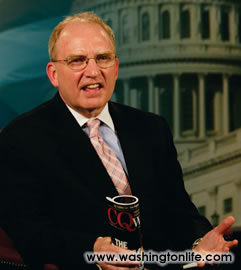The Plame GameBOB MERRY asks, “What will Patrick Fitzgerald’s two-year investigation accomplish?”
|
||||||||||
 |
As special counsel Patrick Fitzgerald continues his investigation into the Valerie Plame leak case–and more journalists are dragged before federal grand juries–I sat down with Congressional Quarterly publisher and veteran Washington journalist Bob Merry, who told me that the ongoing inquiry has unlocked a Pandora’s Box of Woodwardian proportions. Here’s what he had to tell me... verbatim. My own view is that what Scooter Libby is accused of is rather incredible. It’s hard to imagine that he would play games with a grand jury under oath, which is what he seems to have done. But he’s one guy in the administration and I don’t think it’s going to have a great political impact. If the White House had played it smart, I don’t think that this thing would be continuing. They could have said, “Look, we did not break the law, so this prosecutor is going to have to prove that we did, and we didn’t. So we’re going to cooperate fully, we’re not going to play any games.” Had they done that, this thing would likely have been done by now.
I don’t know what to think of Viveca Novak’s role at Time. She was asked to testify after having allegedly said something relevant to the case to Karl Rove’s lawyer while reporting on it. She didn’t tell her supervisors. If somebody on my staff were embroiled in something of this nature, with this much significance and the possibility that it is going to come out, and did not tell me, that’s a firing offense. The fact is, and as Norm Pearlstine’s decision at Time made very clear, the law and the Constitution do not provide any kind of federal protection for reporters or news organizations that may have knowledge regarding criminal justice matters. It’s very unfortunate, but it’s as simple as that. I would be in favor of a federal shield law, recognizing that there are always going to be consequences–effects on civil and criminal cases. We’d have to wind our way through those. But in the meantime, there is no such protection. I don’t think buying notebooks or not buying notebooks is going to have any materiality whatsoever.
I wrote a book some years ago on Joe and Stuart Alsop, who broke news all the time on national security matters. They were under investigation by the FBI on numerous occasions in which vast, extensive investigations took place because the government wanted to know who was leaking information to these guys. Sometimes it was unquestionably classified information. In one particular case, I collected all the FBI field reports that came in from San Francisco and Albuquerque, and Chicago and New York–so many reports were filed and so many people were interviewed– and what came out of it was at least 2,000 people in the federal government knew the classified information in question. The Alsops were pro forma interviewed by the prosecutor and they basically said, “We’ll cooperate as far as we can but we’re not going to give you our source.” And that was the end of it. And that was during the Cold War. I think it was a more sane, more civilized approach to these things than what we’re seeing today.
This case has opened Pandora’s Box. As I said, tough cases make bad law, and it’s a precedent that is going to erode further the circumstances under which journalists are left alone on these things unless they absolutely have to be brought into it. A federal shield law would help. In the meantime it’s going to have whatever impact it’s going to have on eroding journalists’ ability to do their job without being pressured by federal officials.
